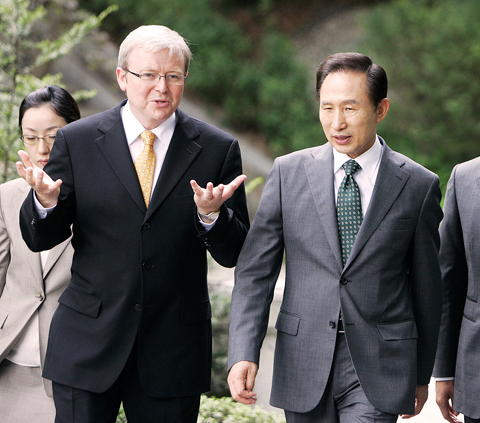South Korea said it will sell or merge 41 of the nation’s 319 state-owned companies as part of President Lee Myung-bak’s pledge to make government-run firms more competitive.
The plans include selling a 49 percent stake in Incheon International Airport Corp and part of Industrial Bank of Korea and its affiliates, the Finance Ministry said in a statement in Gwacheon yesterday.
The government also said it would merge Korea National Housing Corp and Korea Land Corp.

PHOTO: AFP
The proposal is part of Lee’s drive to introduce more efficiency into South Korean companies and spur growth in Asia’s fourth-largest economy.
The plan stops short of including the nation’s biggest state-owned energy companies, Korea Gas Corp and Korea Electric Power Corp, amid concern that selling the utilities would hurt Lee’s popularity and raise energy costs.
“In the longer term, the privatization will benefit companies and consumers,” said Kim Jae-eun, an economist at Hana Daetoo Securities Co in Seoul. “But President Lee is starting the first phase of privatization with caution, as he needs to consider the public opinion and his popularity.”
Yestereday’s announcement includes plans to sell stakes in 14 companies that are now owned by state-run financial institutions including the Korea Development Bank and Korea Asset Management Corp. Among the 14 are Woori Finance Holdings Co, Daewoo Shipbuilding & Marine Engineering Co, Ssangyong Engineering & Construction Co and Daewoo International Corp.
The government will announce further plans to sell or merge as many as many as 100 companies by early next month, Vice Finance Minister Bae Kook-hwan told reporters in Gwacheon.
South Korea also may sell a further holding in Incheon International Airport, in addition to sale of the 49 percent stake announced yesterday, Bae said.
Some government-owned companies “have low productivity and excessive wages and employee benefits,” the ministry said in the statement.
“Improving the management of the state-owned companies will ensure better-quality public services,” it said.
The ministry estimated improved efficiency will save the government about 2 trillion won (US$1.9 billion) a year.
The electricity, gas, water and medical insurance sectors were excluded from the plan “on concerns about rising charges,” it said.
South Korea on July 22 scrapped plans to sell Korea Gas and Korea Electric because of public concern that the sales would increase fees and layoffs at the utilities.
The government will boost investment in companies including Korea National Oil Corp to increase their focus on overseas natural resource projects, the ministry said. Korea Tourism Organization will sell its duty-free shop business.
Korea Real Estate Investment Trust Co, Korea Asset Investment Trust Co, Korea Construction Management Corp and New Seoul Country Club are also among the companies being sold.
The government plans to hold public hearings to discuss further details of the sales and submit a bill to the National Assembly next month.

The Ministry of the Interior (MOI) is to tighten rules for candidates running for public office, requiring them to declare that they do not hold a Chinese household registration or passport, and that they possess no other foreign citizenship. The requirement was set out in a draft amendment to the Enforcement Rules of the Public Officials Election and Recall Act (公職人員選舉罷免法 ) released by the ministry on Thursday. Under the proposal, candidates would need to make the declaration when submitting their registration forms, which would be published in the official election bulletin. The move follows the removal of several elected officials who were

The Republic of China (ROC) is celebrating its 114th Double Ten National Day today, featuring military parades and a variety of performances and speeches in front of the Presidential Office in Taipei. The Taiwan Taiko Association opened the celebrations with a 100-drummer performance, including young percussionists. As per tradition, an air force Mirage 2000 fighter jet flew over the Presidential Office as a part of the performance. The Honor Guards of the ROC and its marching band also heralded in a military parade. Students from Taichung's Shin Min High School then followed with a colorful performance using floral imagery to represent Taiwan's alternate name

FOUR DESIGNATED AREAS: Notices were issued for live-fire exercises in waters south and northwest of Penghu, northeast of Keelung and west of Kaohsiung, they said The military is planning three major annual exercises across the army, navy and air force this month, with the navy’s “Hai Chiang” (海強, “Sea Strong”) drills running from today through Thursday, the Ministry of National Defense said yesterday. The Hai Chiang exercise, which is to take place in waters surrounding Taiwan, would feature P-3C Orion maritime patrol aircraft and S-70C anti-submarine helicopters, the ministry said, adding that the drills aim to bolster the nation’s offshore defensive capabilities. China has intensified military and psychological pressure against Taiwan, repeatedly sending warplanes and vessels into areas near the nation’s air defense identification zone and across

A Chinese takeover of Taiwan would severely threaten the national security of the US, Japan, the Philippines and other nations, while global economic losses could reach US$10 trillion, National Security Council Deputy Secretary-General Lin Fei-fan (林飛帆) wrote in an article published yesterday in Foreign Affairs. “The future of Taiwan is not merely a regional concern; it is a test of whether the international order can withstand the pressure of authoritarian expansionism,” Lin wrote in the article titled “Taiwan’s Plan for Peace Through Strength — How Investments in Resilience Can Deter Beijing.” Chinese President Xi Jinping’s (習近平) intent to take Taiwan by force